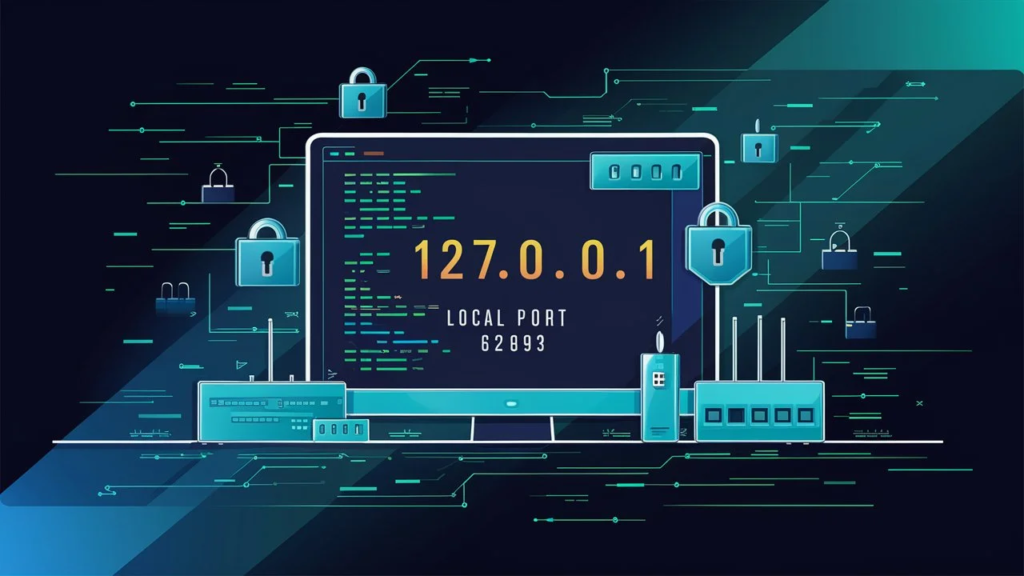If you’re new to the world of Networking, you might have come across the term “127.0.0.1:62893.” But what exactly is it? In this beginner-friendly guide, we will walk you through everything you need to know about this important concept, explain how it works, and why it’s relevant to computer systems and Networking.
What Does 127.0.0.1:62893 Do?
The IP address “127.0.0.1” is known as the loopback address. In simple terms, it is a special IP address that a computer uses to refer to itself. This is commonly called the local host. The part “62893” represents a port number, a specific communication endpoint used by network services. So, when you see “127.0.0.1:62893,” it signifies a computer referring to itself and using port 62893 for some kind of communication.
How does this work?
When a computer uses “127.0.0.1,” it doesn’t actually communicate over a physical network. Instead, it sends messages back to itself internally. This is useful for testing purposes. For example, developers might use “127.0.0.1:62893” to test applications locally without making them available on the broader internet. It’s like asking your computer to have a private conversation with itself, ensuring everything works before sharing it with others.
Why Do We Use 127.0.0.1:62893?
The loopback address “127.0.0.1” is crucial for network testing and software development. Here’s why it’s important:

- Testing Locally: When developers create software that interacts with a server or the internet, they often need to test it before launching it live. Using “127.0.0.1,” they can simulate this communication within the same machine, ensuring their code works as expected without exposing it to the public.
- Internal Networking: “127.0.0.1” helps ensure that applications running on the same computer can communicate without needing to connect to an external network. The port number “62893” may indicate a specific service, function, or application that is running locally.
In simpler terms, using “127.0.0.1:62893” is like running a rehearsal for a play before the actual performance. It helps identify problems early on and make sure that everything works smoothly.
Is 127.0.0.1:62893 Safe?
Yes, 127.0.0.1:62893 is completely safe to use as long as you know what it is and how it functions. Since “127.0.0.1” refers to your own computer and doesn’t involve external networks, it’s not exposed to hackers or external threats by default. However, there are a few considerations to keep in mind to ensure safety.
Can Hackers Use 127.0.0.1:62893?
In general, hackers cannot directly exploit 127.0.0.1:62893 because it is an internal IP address. Since it refers to your computer alone, there is no outside access. However, if you’re running certain services on your local machine that have vulnerabilities and your system is misconfigured, there could be a potential risk. But under normal circumstances, as long as your computer’s firewall and security systems are active, it’s unlikely anyone outside can access your “localhost.”
Do All Computers Have This Address?
Yes, every computer uses “127.0.0.1” as a standard loopback address. Whether you’re using a Windows PC, a Mac, or a Linux machine, this IP address behaves the same way on all devices. It’s like a universal way for computers to talk to themselves when needed.
Why Should I Care About 127.0.0.1:62893?
Understanding “127.0.0.1:62893” is important, especially if you’re working in IT, programming, or even gaming. For example, if you’re trying to troubleshoot network issues or develop software, knowing how to use “127.0.0.1” can help you diagnose problems and test solutions locally without needing a live connection. It’s also helpful to know this address because some games and applications use it for local multiplayer or LAN play.
How Does 127.0.0.1:62893 Help Computers?
“127.0.0.1” simplifies the process of communication within a computer. Since computers use IP addresses to send and receive data, the loopback address “127.0.0.1” acts like an internal mailbox, helping a computer send messages to itself without going through an external network.
For developers, this is extremely useful because it allows them to build and test networked applications without needing to access the internet. Port numbers like “62893” are used to differentiate between multiple applications or services running on the same device. By using specific port numbers, each service gets its own private channel to send and receive data.
Who Needs to Know About 127.0.0.1:62893?

- Software Developers: They frequently use “127.0.0.1:62893” for testing web applications or networked software. Understanding this address helps them test things on their local machine before going live.
- Network Engineers: They might use the loopback address to troubleshoot problems in networking configurations or to verify that services are running properly on a system.
- Tech Enthusiasts: Even if you’re not in a technical field, knowing how “127.0.0.1” works can be handy when troubleshooting computer issues at home or configuring your own server or gaming setup.
How Can I Learn More About 127.0.0.1:62893?
If you want to dive deeper into understanding “127.0.0.1” and port numbers like “62893,” here are a few ways to continue your education:
- Online Tutorials: Websites like Coursera, Udemy, or YouTube offer free courses on basic Networking and programming that explain the use of IP addresses like “127.0.0.1.”
- Networking Books: There are excellent books that break down networking for beginners, such as “Networking for Dummies.”
- Hands-On Experience: The best way to understand “127.0.0.1” is to experiment on your own computer. Try setting up a local web server using tools like XAMPP or WAMP to get real-life experience with the loopback address.
What Happens If 127.0.0.1:62893 Doesn’t Work?
If you encounter issues with “127.0.0.1:62893,” it could be due to several reasons. Perhaps the service you’re trying to access isn’t running, or your firewall might be blocking the connection. In most cases, a simple restart of the service or adjusting firewall settings will fix the issue.
Can I Change 127.0.0.1:62893 on My Computer?
Technically, you can change the port number (62893) but not the IP address “127.0.0.1.” The loopback address is set by default and cannot be altered. However, services running on your machine can use different port numbers based on how they are configured. Port numbers can be changed in software configuration files or server settings, depending on the application.
Conclusion: The Basics of 127.0.0.1:62893
In conclusion, “127.0.0.1:62893” is a critical part of how computers communicate internally. The loopback address allows a machine to talk to itself for testing and local networking purposes, while the port number helps specify which service or application is being accessed. Whether you’re a beginner or an experienced user, knowing how this works can help in troubleshooting, development, and everyday computer use.
Bonus: Fun Facts About 127.0.0.1!
- Did you know? The loopback range of IP addresses actually goes from “127.0.0.1” all the way to “127.255.255.255”—but “127.0.0.1” is the most commonly used.
- For gamers, some older multiplayer games used “127.0.0.1” for local LAN play, allowing friends to play together on the same network.
- In networking tests, many tools and software frameworks automatically use “127.0.0.1” to ensure everything is working before the real-world deployment.
The Bottom Line
Understanding “127.0.0.1:62893” might seem technical at first, but once you grasp the concept of the loopback address and port numbers, it becomes much simpler. This combination is crucial for local testing, network configurations, and ensuring software runs smoothly on your computer. Whether you’re a developer, a gamer, or just someone interested in technology, having a basic understanding of this address can be incredibly useful.
By now, you should have a solid grasp of what “127.0.0.1:62893” is, how it works, and why it’s important for your computer’s networking functionality.










Leave a Reply